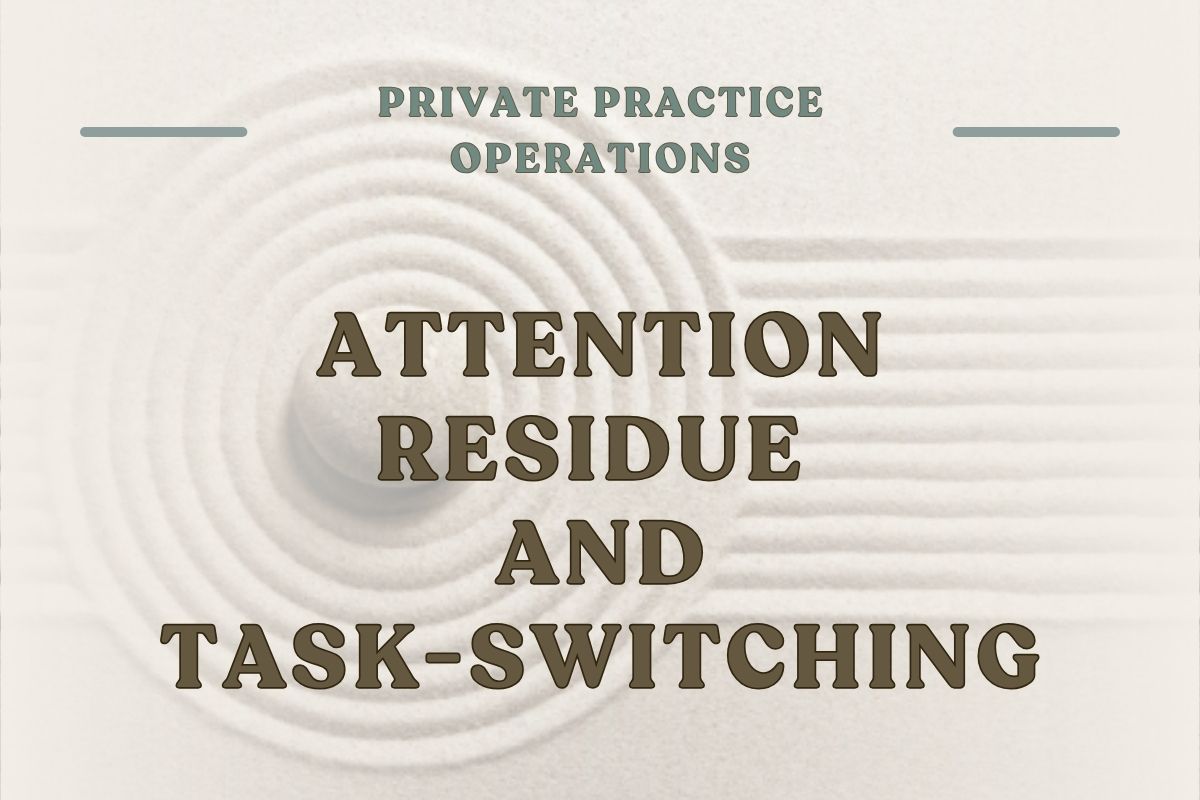5 Strategies to Improve Productivity in Your Private Practice
Running a private practice often feels like a balancing act between two competing forces: clinical work and admin work. That […]

Ever found yourself staring at session notes, unable to concentrate because your mind is still caught up in a difficult client conversation from hours ago? For private practice owners, this mental fog isn’t just fatigue—it’s a productivity drain with a scientific name: attention residue. While social media often takes the blame for disrupted focus, these subtler challenges can significantly impact your practice’s efficiency and quality of care.
The concept of attention residue, introduced by Professor Sophie Leroy, reveals a crucial insight: when you switch tasks without fully completing the first, your mind doesn’t make a clean break. This lingering mental “tab” continues to consume cognitive resources, even as you attempt to focus on new tasks:
● Mental Bandwidth: Your brain maintains multiple active threads, reducing available focus for current work
● Quality Impact: Clinical documentation and treatment planning require full attention for optimal accuracy
● Energy Drain: Accumulated residue throughout the day leads to increased mental fatigue
Task switching isn’t merely moving between responsibilities—it’s a cognitively expensive process that impacts your practice in several ways:
● Cognitive Load: Each transition requires your brain to close one mental context and open another
● Time Multiplication: Simple interruptions can fragment one task into multiple steps, extending completion time
● Quality Concerns: In healthcare settings, divided attention can lead to documentation errors or missed clinical insights
Time blocking offers a practical solution for private practice owners:
For healthcare providers, immediate responsiveness often feels like a professional obligation. However, consider:
● Quality Priority: Clients benefit more from thorough, focused attention than instant responses
● Clear Boundaries: Establish and communicate realistic response timeframes
● Enhanced Service: Protected focus time enables better quality documentation and treatment planning
Implementing these strategies can transform your practice:
● Improved Clinical Quality: Full attention enhances treatment planning and documentation accuracy
● Reduced Stress: Fewer mental tabs open means less cognitive overwhelm
● Greater Efficiency: Completed tasks actually take less total time when done with full focus
Start with these practical steps:
Understanding attention residue and task switching provides a foundation for meaningful change in your practice. By implementing strategic time blocking and protecting your mental energy, you can enhance both the quality of your clinical work and your professional satisfaction.
Ready to transform your practice’s productivity? Start by identifying one block of time tomorrow that you can protect for focused, uninterrupted work.
As a CPA specializing in working with therapists, we understand the unique financial challenges of running a practice. Whether you have questions about taxes, profitability, or optimizing your finances, we’re here to help—no pressure, no sales pitch, just a conversation to see how we can support you.
Running a private practice often feels like a balancing act between two competing forces: clinical work and admin work. That […]
When first launching a private practice, it’s common to want to appeal to as many clients as possible—after all, it […]
Introduction Even the best CPAs and the most dedicated practice owners don’t always mesh well—and it’s not about skill or […]